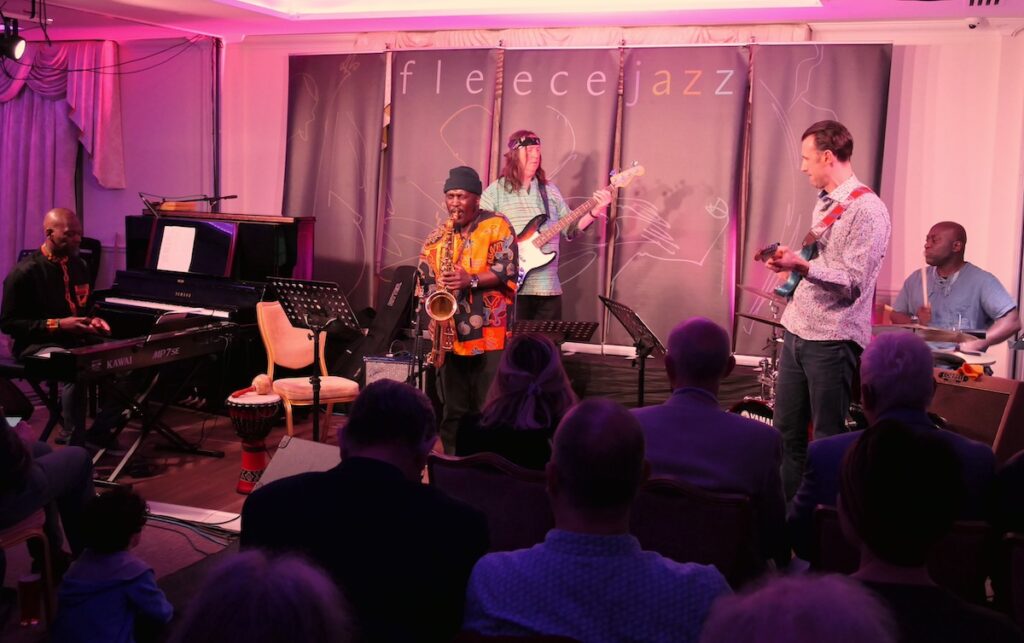
Steve (and a bit of Dave) says:
I’m still basking in the euphoria from last night’s Jazz Africa performance. There were many astounding moments throughout both sets from our six musicians. Yes, six, because we had a guest star on percussion! During the first set, six-year-old Jackson sat in the centre aisle in front of Tony Kofi. He had a water bottle that he used to add to the percussion on stage. Tony brought him on to the stage, gave him a maraca and he played with the band during “Aloka Party”. It will be something he will never forget (and nor will we).
From the exuberant, life-affirming music of Africa’s best-known jazz saxophonist, Manu Dibango, and the pioneer of Afrobeat, Fela Kuti, the gig started as it intended to carry on with an infectious blend of funk, jazz and traditional African rhythms. You could dance to the music throughout both sets and its humanity incited the purest joy. The rhythm was key throughout, with each member of the band playing percussion instruments (claves, bones, drums, congas and maracas) at some point. Stuart Fidler, while plucking the strings of his guitar with two fingers in the typical musical style of West African highlife, almost managed to play a hand drum at the same time! Encouraged by Basil Hodge and Tony, different sections of our audience contributed handclapping that created some complex polyrhythms. Winston Clifford managed to do all of that single-handed on his drumkit and amazed us all with his prodigious skills and inventiveness. It was wonderful to have Winston back at the Fleece after so long. We were also reminded of his many talents from his beautiful vocals on Abdullah Ibrahim’s ‘African Marketplace’, a song with deep political roots (see setlist). The polyrhythms were enhanced by bassist Mike Edmunds: as well as providing the pulse and the harmonies, he used the bass guitar as a percussive instrument.
Aside from his warmth and playfulness, Tony Kofi reaffirmed his place as a firm favourite with our audiences with his versatility and superhuman energy on a range of saxophones and how the sound from his horn just continues to soar. I just didn’t want it to stop on ‘African Marketplace’.
Jazz Africa is of course Basil Hodge’s baby, although he would be the first to emphasise that it is a team effort. Aside from his use of claves and handclaps, he led with some excellent work on the electric piano as well as acoustic, managing to make both sound authentic and vital in the African music setting, so that the electric piano could be mistaken for a marimba at times.
One more mention of our highly appreciative and enthusiastic audience: there was, as we predicted, ‘dancing in the aisles’ with some wild moves from our technical team and others who could not restrain themselves and celebrated the joy of African Jazz in a truly honest and human way.
On 24 April, the much acclaimed gig, “The Music of Dudley Moore” will be with us, with composer, pianist, and brilliant presenter Chris Ingham, Paul Higgs on trumpet, Simon Thorpe on bass, and drummer George Double. Tickets are going well for this gig, so do try not to miss it.
JAZZ AFRICA: THE ORIGINS FROM ROOTS TO NOW
SETLIST, FLEECE JAZZ 10/4/24
- Soul Makossa (Manu Dibango) – an international hit for Dibango in 1972 that inspired (and was effectively borrowed by) the later music of Michael Jackson among others. Makossa is a dance tradition of the Douala people in Cameroon, where Dibango was born.
- Shakara (Fela Kuti)
- Mannenberg (Abdullah Ibrahim, formerly known as Dollar Brand) Mannenberg is a township of Cape Town, South Africa, that was created by the apartheid government for low-income “Coloured” families in 1966 as a result of the forced removal campaign by the National Party. The song became an anthem of the struggle against Apartheid, evoking South Africa’s dark past but also celebrating its people and their courageous resistance to oppression.
- Aloka Party (Manu Dibango)
* * * * * * *
- Water No Got No Enemy (Fela Kuti)
- African Marketplace (Abdullah Ibrahim)
- Big Blow (Manu Dibango)
- Goro City (Manu Dibango)
- Niger Mambo (Randy Weston)